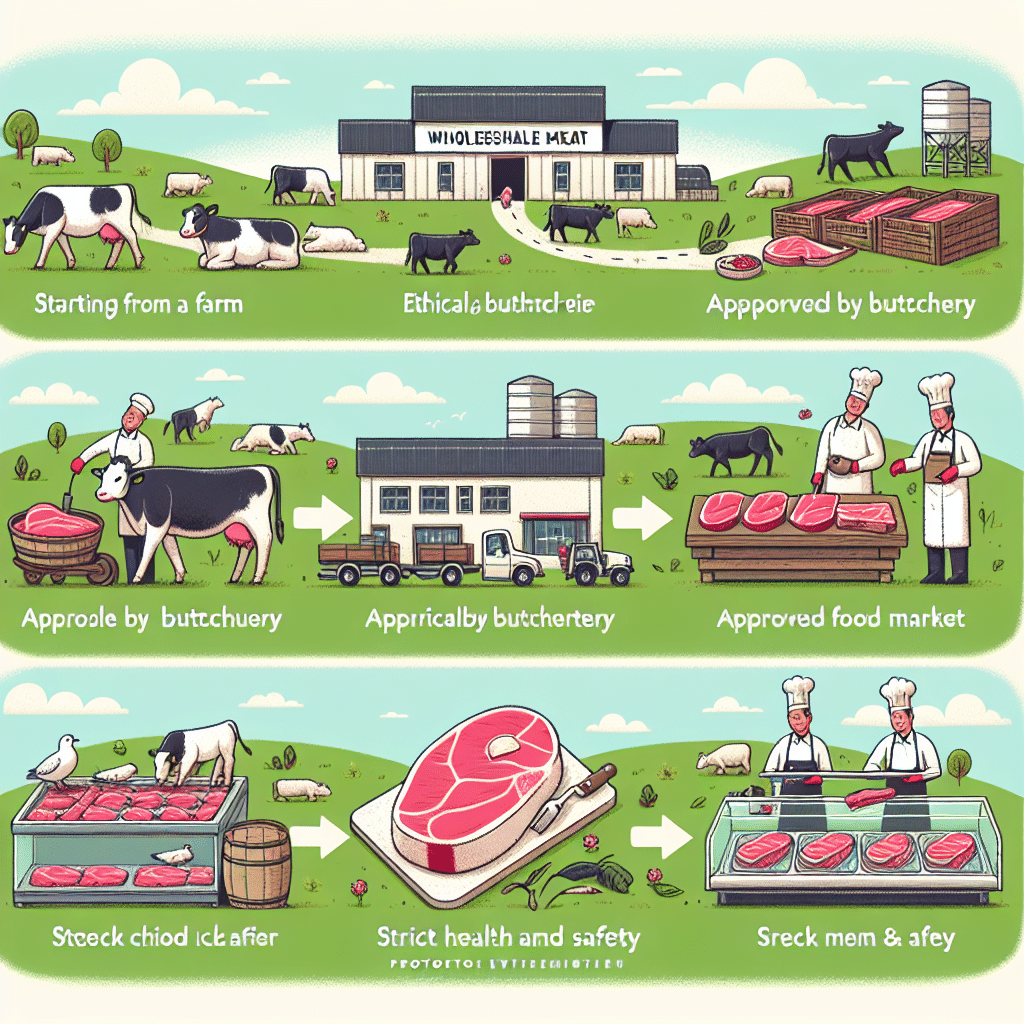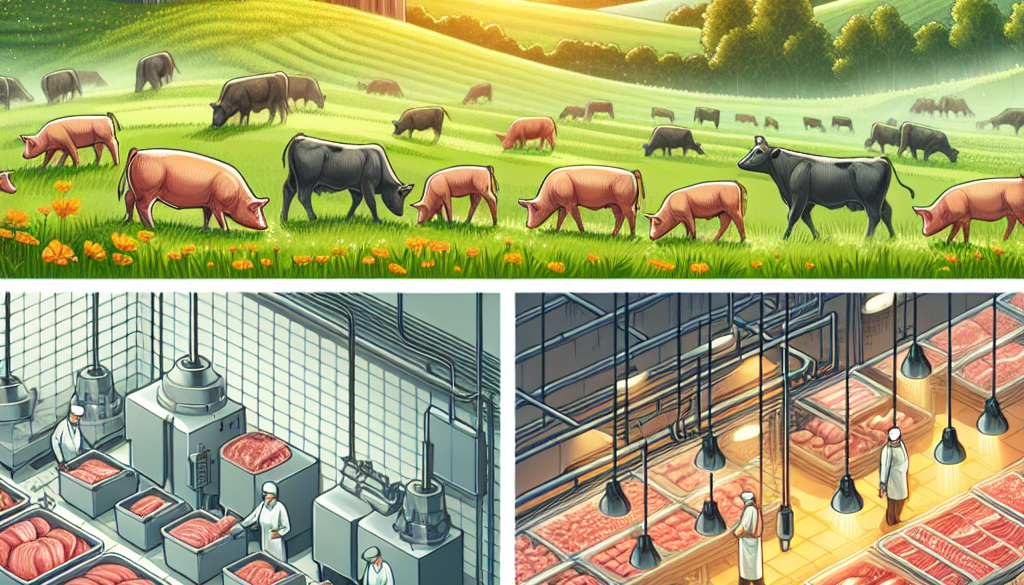From Farm to Table: The Journey of Wholesale Meat
-
Table of Contents
Wholesale Meat’s Path: From Farm to Table

The journey of wholesale meat from farm to table is a complex process that involves numerous steps, each critical to ensuring the quality, safety, and freshness of the meat products that reach consumers. This article will delve into the intricacies of this journey, highlighting the importance of each stage and the role it plays in delivering wholesome meat to the market.
The Farming Foundation
It all begins at the farm, where livestock is raised. The quality of meat is heavily dependent on the health and well-being of the animals, which is why farmers employ various practices to ensure their livestock is healthy and well-nourished.
- Feeding: Animals are typically fed a diet that is designed to promote growth and maintain health. This may include grains, grasses, and sometimes supplements.
- Living Conditions: Farmers strive to provide clean and comfortable living conditions to reduce stress and prevent disease among the animals.
- Healthcare: Regular veterinary check-ups and vaccinations are essential to prevent diseases that could affect the animals and potentially the end consumers.
Processing and Packaging
Once the animals reach the appropriate age and weight, they are transported to processing facilities. Here, they are humanely slaughtered and processed into various cuts of meat.
- Slaughter: This step must comply with strict regulations to ensure it is carried out humanely and hygienically.
- Inspection: Meat is inspected by government agencies to ensure it is free from disease and contamination.
- Processing: The meat is then cut, trimmed, and prepared into wholesale cuts, which may include steaks, roasts, and ground meat.
- Packaging: The meat is packaged in a way that maintains its freshness and prevents contamination. Vacuum sealing and modified atmosphere packaging are common methods used.
Quality Control and Safety
Throughout the meat processing stage, quality control and safety are paramount. Facilities must adhere to Hazard Analysis Critical Control Points (HACCP) protocols, which are designed to prevent hazards that could cause foodborne illnesses.
- Temperature Control: Meat must be kept at safe temperatures to prevent bacterial growth.
- Sanitation: Processing plants are required to maintain high levels of cleanliness to avoid cross-contamination.
- Traceability: Each batch of meat is given a unique identifier, allowing it to be traced back to its source in the event of a recall.
Distribution and Wholesale
After processing and packaging, the meat is ready for distribution. It is transported under controlled temperatures to wholesalers who then sell it to retailers, restaurants, and other food service providers.
- Transportation: Refrigerated trucks are used to maintain the cold chain during transportation.
- Wholesale Markets: Wholesalers may sell meat in large quantities or break it down into smaller packages for different customers.
- Inventory Management: Wholesalers must manage their inventory effectively to ensure that meat is sold before it reaches its expiration date.
From Wholesale to Retail
At the retail level, meat is often further processed and packaged to meet the specific needs of consumers. Retailers must also ensure that the meat is stored and handled properly until it is sold.
- Butchering: Some retailers have in-house butchers who prepare custom cuts of meat for customers.
- Display: Meat is displayed in refrigerated cases to maintain freshness and appeal to consumers.
- Labeling: Retail packaging includes labels that provide information about the cut, weight, price, and expiration date of the meat.
Consumer Purchase and Consumption
The final step in the journey is when consumers purchase the meat and bring it to their tables. Consumers play a role in ensuring the meat remains safe to eat by practicing proper food handling and storage at home.
- Storage: Consumers should store meat in the refrigerator or freezer immediately after purchase.
- Preparation: Proper cooking techniques are essential to kill any remaining bacteria in the meat.
- Enjoyment: When prepared safely and properly, meat provides a nutritious and enjoyable component of a balanced diet.
Conclusion
The journey of wholesale meat from farm to table is a testament to the intricate systems in place to ensure food safety and quality. Each step, from farming practices to processing, packaging, distribution, and retail, plays a crucial role in delivering fresh, safe, and nutritious meat to consumers. By understanding this journey, consumers can appreciate the efforts taken to provide them with high-quality meat products and make informed choices about their purchases.
Discover ETprotein’s High-Quality Protein Products
While meat is a traditional source of protein, there are alternative high-quality protein products available for those seeking variety or plant-based options. ETprotein offers a range of organic bulk vegan proteins that cater to different dietary needs and preferences. Their products, including organic rice protein, pea protein, and various seed proteins, are characterized by a neutral taste, non-GMO, and allergen-free attributes. For those interested in incorporating these high-quality protein sources into their diet, ETprotein is a reliable supplier worth considering.
About ETprotein:
ETprotein, a reputable protein and L-(+)-Ergothioneine (EGT) Chinese factory manufacturer and supplier, is renowned for producing, stocking, exporting, and delivering the highest quality organic bulk vegan proteins and L-(+)-Ergothioneine. They include Organic rice protein, clear rice protein, pea protein, clear pea protein, watermelon seed protein, pumpkin seed protein, sunflower seed protein, mung bean protein, peanut protein, and L-(+)-Ergothioneine EGT Pharmaceutical grade, L-(+)-Ergothioneine EGT food grade, L-(+)-Ergothioneine EGT cosmetic grade, L-(+)-Ergothioneine EGT reference grade and L-(+)-Ergothioneine EGT standard. Their offerings, characterized by a neutral taste, non-GMO, allergen-free attributes, with L-(+)-Ergothioneine purity over 98%, 99%, cater to a diverse range of industries. They serve nutraceutical, pharmaceutical, cosmeceutical, veterinary, as well as food and beverage finished product distributors, traders, and manufacturers across Europe, USA, Canada, Australia, Thailand, Japan, Korea, Brazil, and Chile, among others.
ETprotein specialization includes exporting and delivering tailor-made protein powder and finished nutritional supplements. Their extensive product range covers sectors like Food and Beverage, Sports Nutrition, Weight Management, Dietary Supplements, Health and Wellness Products, and Infant Formula, ensuring comprehensive solutions to meet all your protein needs.
As a trusted company by leading global food and beverage brands and Fortune 500 companies, ETprotein reinforces China’s reputation in the global arena. For more information or to sample their products, please contact them and email sales(at)ETprotein.com today.












